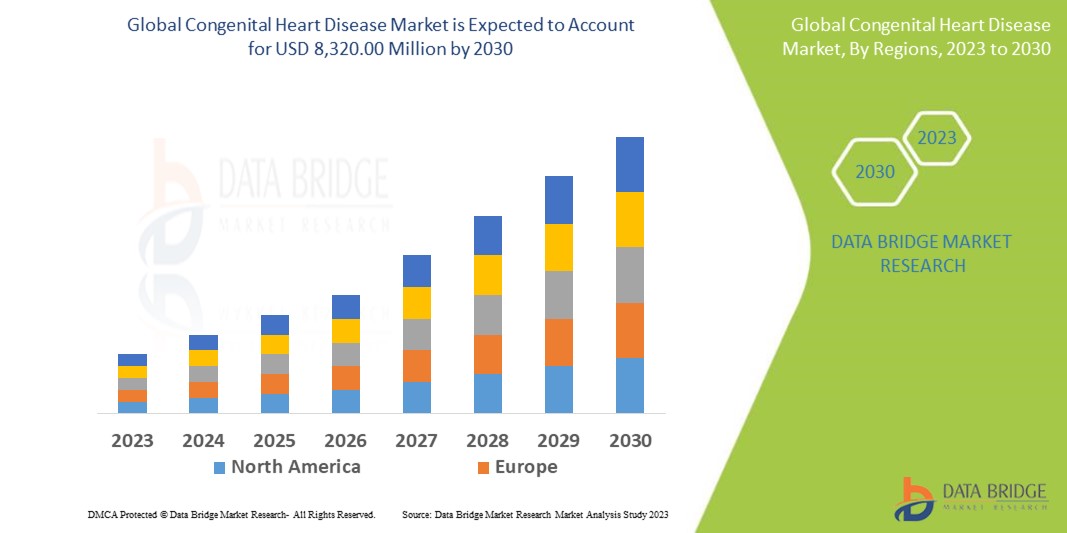世界の先天性心疾患市場
Market Size in USD Billion
CAGR :
% 
 USD
4,110.00 Million
USD
8,320.00 Million
2022
2030
USD
4,110.00 Million
USD
8,320.00 Million
2022
2030
| 2023 –2030 | |
| USD 4,110.00 Million | |
| USD 8,320.00 Million | |
|
|
|
|
先天性心疾患の世界市場 - タイプ別(心臓弁欠損、心臓壁欠損、血管欠損、その他)、診断(心電図、胸部X線、心エコー図、経食道心エコー図、パルスオキシメトリー、運動負荷試験、心臓CTスキャンまたはMRI、心臓カテーテル法、その他)、治療(投薬、手術、経過観察、その他)、投与経路(経口、非経口、その他)、エンドユーザー(病院、専門クリニック、その他)、流通チャネル(病院薬局、小売薬局、その他) - 2030年までの業界動向と予測。
先天性心疾患の市場分析と規模
先天性心疾患は先天性心疾患とも呼ばれ、出生時から心臓の構造に 1 つ以上の異常がある状態です。先天性心疾患の症状には、息切れ、不整脈、チアノーゼ、浮腫、運動時の疲労感などがあります。
データブリッジマーケットリサーチは、2022年に41億1,000万米ドルだった世界の先天性心疾患市場は、2030年までに83億2,000万米ドルに達し、2023年から2030年の予測期間中に9.1%のCAGRを達成すると予測しています。「心臓弁欠損」は、がんの罹患率の増加とがんの診断および治療の研究開発の増加により、世界の先天性心疾患市場のアプリケーションセグメントを支配しています。データブリッジマーケットリサーチがまとめた市場レポートには、市場価値、成長率、セグメンテーション、地理的範囲、主要企業などの市場シナリオに関する洞察に加えて、詳細な専門家の分析、患者の疫学、パイプライン分析、価格分析、規制の枠組みも含まれています。
先天性心疾患市場の範囲とセグメンテーション
|
レポートメトリック |
詳細 |
|
予測期間 |
2023年から2030年 |
|
基準年 |
2022 |
|
歴史的な年 |
2021 (2015~2020年にカスタマイズ可能) |
|
定量単位 |
売上高(百万米ドル)、販売数量(個数)、価格(米ドル) |
|
対象セグメント |
タイプ (心臓弁の欠陥、心臓壁の欠陥、血管の欠陥、その他)、診断 (心電図、胸部 X 線、心エコー図、経食道心エコー図、パルスオキシメトリー、運動負荷試験、心臓 CT スキャンまたは MRI、心臓カテーテル法、その他)、治療 (投薬、手術、経過観察、その他)、投与経路 (経口、非経口、その他)、エンドユーザー (病院、専門クリニック、その他)、流通チャネル (病院薬局、小売薬局、その他) |
|
対象国 |
北米では米国、カナダ、メキシコ、ヨーロッパではドイツ、フランス、英国、オランダ、スイス、ベルギー、ロシア、イタリア、スペイン、トルコ、その他のヨーロッパ、ヨーロッパでは中国、日本、インド、韓国、シンガポール、マレーシア、オーストラリア、タイ、インドネシア、フィリピン、アジア太平洋地域 (APAC) ではその他のアジア太平洋地域 (APAC)、中東およびアフリカ (MEA) の一部としてサウジアラビア、UAE、南アフリカ、エジプト、イスラエル、中東およびアフリカ (MEA) の一部としてその他の中東およびアフリカ (MEA)、南米の一部としてブラジル、アルゼンチン、その他の南米 |
|
対象となる市場プレーヤー |
アボット ラボラトリーズ(米国)、アストラゼネカ(英国)、ベクトン ディクソン(米国)、バイオ・ラッド ラボラトリーズ(米国)、ボストン サイエンティフィック(米国)、ラボラトリー コーポレーション オブ アメリカ ホールディングス(ラボコープ)(米国)、F. ホフマン・ラ ロシュ(スイス)、グラクソスミスクライン(英国)、ヤンセンファーマシューティカルズ(米国)、メドトロニック アイルランド、ビアトリス(米国)、ノバルティス(スイス)、ファイザー(米国)、ランドックス ラボラトリーズ(英国)、レスポンス バイオメディカル(カナダ)、サノフィ(フランス)、シーメンス ヘルシニアーズ(ドイツ)、サーモフィッシャーサイエンティフィック(米国)、ベリセル(米国) |
|
市場機会 |
|
市場の定義
先天性心疾患とは、出生時に存在する心臓欠陥の診断、治療、管理を取り巻く経済エコシステムを指します。これには、先天性心疾患に特有の医療機器、医薬品、診断ツール、外科的介入、医療サービスが含まれます。この市場は、先天性心疾患を持つ個人に効果的なケアを提供する患者、医療提供者、およびその他の利害関係者のニーズに対応します。
先天性心疾患の世界市場の動向
ドライバー
- 増加している罹患率
先天性心疾患の罹患率が世界的に増加していることは、市場にとって大きな推進力となっています。診断技術の向上、認知度の高まり、医療サービスへのアクセスの改善により、より多くの症例が特定され、患者数が増加しています。
- 小児心臓病学への注目の高まり
小児心臓病学と先天性心疾患を持つ子供に対する専門治療への重点が高まっていることが、市場を牽引しています。小児心臓病センター、専用の研究開発努力、小児に特化した医療機器の入手可能性が市場の成長に貢献しています。
機会
- インターベンショナル心臓病学の進歩
トランのカテーテル介入やハイブリッド手術などの介入心臓病学技術の進歩により、低侵襲治療の選択肢が生まれています。これらの手術により、開胸手術の必要性が減り、患者の転帰が改善されます。
- 小児用心臓デバイスの使用増加
先天性心疾患を持つ小児患者向けに特別に設計された特殊な心臓デバイスの開発は、チャンスをもたらします。これらのデバイスは、小児特有の解剖学的および生理学的特徴に対応できるため、より良い結果と生活の質の向上につながります。
制約/課題
- 治療の複雑さ
CHD にはさまざまな症状があり、それぞれに特有の複雑さがあります。この複雑さにより、治療法は個々の患者に合わせて調整する必要があることが多く、標準化された治療法の開発が困難になっています。これにより、治療の拡張性と費用対効果が制限される可能性があります。
-
高額な治療費
先天性心疾患の治療は、特に複雑なケースでは費用がかかる場合があります。治療費が高額なため、一部の患者にとっては治療の障壁となり、医療制度や保険会社にとって財政的な課題となる可能性があります。
この世界的な先天性心疾患市場レポートは、最近の新しい開発、貿易規制、輸出入分析、生産分析、バリュー チェーンの最適化、市場シェア、国内および現地の市場プレーヤーの影響、新たな収益源の観点から見た機会の分析、市場規制の変更、戦略的市場成長分析、市場規模、カテゴリ市場の成長、アプリケーションのニッチと優位性、製品の承認、製品の発売、地理的拡大、市場における技術革新の詳細を提供します。世界的な先天性心疾患市場の詳細については、アナリスト ブリーフについて Data Bridge Market Research にお問い合わせください。当社のチームが情報に基づいた市場決定を行い、市場の成長を達成できるようお手伝いします。
最近の動向
- 2021年6月、アボットは未熟児の先天性心疾患の治療薬としてインドでアムプラッツァーピッコロオクルーダーを発売した。これにより同社は製品ポートフォリオを拡大することができた。
- 2020 年 8 月、メドトロニックは Harmony 経カテーテル肺動脈弁 (TPV) システムの FDA 承認を取得しました。このデバイスは、右室流出路 (RVOT) 導管の機能不全を伴う先天性心疾患患者の治療に使用されます。
先天性心疾患の世界市場規模
先天性心疾患の世界市場は、種類、診断、治療、投与経路、エンドユーザー、流通チャネルに基づいてセグメント化されています。これらのセグメントの成長は、業界のわずかな成長セグメントの分析に役立ち、ユーザーに貴重な市場概要と市場洞察を提供し、コア市場アプリケーションを特定するための戦略的決定を下すのに役立ちます。
タイプ
- 心臓弁の欠陥
- 心臓壁の欠陥
- 血管の欠陥
- その他
診断
- 心電図
- 胸部X線
- 心エコー検査
- 経食道心エコー検査
- パルスオキシメトリー
- 運動負荷試験
- 心臓CTスキャンまたはMRI
- 心臓カテーテル検査
- 他の
処理
- 医薬品
- 手術
- 用心深く待つ
- その他
投与経路
- オーラル
- 非経口
- その他
エンドユーザー
- 病院
- 専門クリニック
- その他
流通チャネル
- 病院薬局
- 小売薬局
- その他
世界の先天性心疾患市場分析/洞察
世界の先天性心疾患市場が分析され、市場規模の洞察と傾向が、上記のように国、種類、診断、治療、投与経路、エンドユーザー、流通チャネル別に提供されます。
世界の先天性心疾患市場レポートでカバーされている国は、北米では米国、カナダ、メキシコ、ヨーロッパではドイツ、フランス、英国、オランダ、スイス、ベルギー、ロシア、イタリア、スペイン、トルコ、ヨーロッパではその他のヨーロッパ、中国、日本、インド、韓国、シンガポール、マレーシア、オーストラリア、タイ、インドネシア、フィリピン、アジア太平洋地域 (APAC) ではその他のアジア太平洋地域 (APAC)、中東およびアフリカ (MEA) の一部としてサウジアラビア、UAE、南アフリカ、エジプト、イスラエル、中東およびアフリカ (MEA) の一部としてその他の中東およびアフリカ (MEA)、南米の一部としてブラジル、アルゼンチン、南米のその他の地域です。
北米は、医療施設の強力な基盤、市場における主要企業の強力な存在、先天性心疾患製品の需要の高まり、この地域での研究活動の増加により、世界の先天性心疾患市場を支配しています。
アジア太平洋地域は、意識を高めるための政府の取り組みの増加、医療ツーリズムの増加、地域における研究活動の拡大、大規模な未開拓市場の存在、大規模な人口プール、地域における質の高い医療に対する需要の高まりにより、2023年から2030年の予測期間中に大幅な成長が見込まれています。
レポートの国別セクションでは、市場の現在および将来の傾向に影響を与える国内市場における個別の市場影響要因と規制の変更も提供しています。下流および上流のバリュー チェーン分析、技術動向、ポーターの 5 つの力の分析、ケース スタディなどのデータ ポイントは、個々の国の市場シナリオを予測するために使用される指標の一部です。また、国別データの予測分析を提供する際には、グローバル ブランドの存在と可用性、および地元および国内ブランドとの競争が激しいか少ないために直面する課題、国内関税と貿易ルートの影響も考慮されます。
ヘルスケアインフラの成長 導入ベースと新技術の浸透
世界の先天性心疾患市場では、各国の医療設備支出の増加、世界の先天性心疾患市場向けのさまざまな種類の製品のインストールベース、ライフライン曲線を使用するテクノロジーの影響、医療規制シナリオの変化とそれらが世界の先天性心疾患市場に与える影響など、詳細な市場分析も提供されます。データは、2015年から2020年までの履歴期間で利用できます。
競争環境と世界の先天性心疾患市場シェア分析
世界の先天性心疾患市場の競争状況は、競合他社ごとに詳細を提供します。含まれる詳細には、会社概要、会社の財務状況、生み出される収益、市場の可能性、研究開発への投資、新しい市場への取り組み、世界的なプレゼンス、生産拠点と施設、生産能力、会社の長所と短所、製品の発売、製品の幅と広さ、アプリケーションの優位性などがあります。提供された上記のデータ ポイントは、世界の先天性心疾患市場に関連する会社の焦点にのみ関連しています。
世界の先天性心疾患市場で活動している主要企業は次のとおりです。
- アボットラボラトリーズ(米国)
- アストラゼネカ(英国)
- ベクトン・ディクソン(米国)
- バイオ・ラッド・ラボラトリーズ(米国)
- ボストン・サイエンティフィック社(米国)
- ラボラトリー・コーポレーション・オブ・アメリカ・ホールディングス(ラボコープ)(米国)
- F.ホフマン・ラ・ロシュ社(スイス)
- グラクソ・スミスクライン(英国)
- ヤンセンファーマシューティカルズ(米国)
- メドトロニック – アイルランド
- ビアトリス社(米国)
- ノバルティスAg(スイス)
- ファイザー社(米国)
- ランドックス・ラボラトリーズ社(英国)
- レスポンス・バイオメディカル・コーポレーション(カナダ)
- サノフィSA(フランス)
- シーメンス ヘルシナーズ(ドイツ)
- サーモフィッシャーサイエンティフィック株式会社(米国)
- ベリセルコーポレーション(米国)
SKU-
世界初のマーケットインテリジェンスクラウドに関するレポートにオンラインでアクセスする
- インタラクティブなデータ分析ダッシュボード
- 成長の可能性が高い機会のための企業分析ダッシュボード
- カスタマイズとクエリのためのリサーチアナリストアクセス
- インタラクティブなダッシュボードによる競合分析
- 最新ニュース、更新情報、トレンド分析
- 包括的な競合追跡のためのベンチマーク分析のパワーを活用
調査方法
データ収集と基準年分析は、大規模なサンプル サイズのデータ収集モジュールを使用して行われます。この段階では、さまざまなソースと戦略を通じて市場情報または関連データを取得します。過去に取得したすべてのデータを事前に調査および計画することも含まれます。また、さまざまな情報ソース間で見られる情報の不一致の調査も含まれます。市場データは、市場統計モデルと一貫性モデルを使用して分析および推定されます。また、市場シェア分析と主要トレンド分析は、市場レポートの主要な成功要因です。詳細については、アナリストへの電話をリクエストするか、お問い合わせをドロップダウンしてください。
DBMR 調査チームが使用する主要な調査方法は、データ マイニング、データ変数が市場に与える影響の分析、および一次 (業界の専門家) 検証を含むデータ三角測量です。データ モデルには、ベンダー ポジショニング グリッド、市場タイムライン分析、市場概要とガイド、企業ポジショニング グリッド、特許分析、価格分析、企業市場シェア分析、測定基準、グローバルと地域、ベンダー シェア分析が含まれます。調査方法について詳しくは、お問い合わせフォームから当社の業界専門家にご相談ください。
カスタマイズ可能
Data Bridge Market Research は、高度な形成的調査のリーダーです。当社は、既存および新規のお客様に、お客様の目標に合致し、それに適したデータと分析を提供することに誇りを持っています。レポートは、対象ブランドの価格動向分析、追加国の市場理解 (国のリストをお問い合わせください)、臨床試験結果データ、文献レビュー、リファービッシュ市場および製品ベース分析を含めるようにカスタマイズできます。対象競合他社の市場分析は、技術ベースの分析から市場ポートフォリオ戦略まで分析できます。必要な競合他社のデータを、必要な形式とデータ スタイルでいくつでも追加できます。当社のアナリスト チームは、粗い生の Excel ファイル ピボット テーブル (ファクト ブック) でデータを提供したり、レポートで利用可能なデータ セットからプレゼンテーションを作成するお手伝いをしたりすることもできます。














